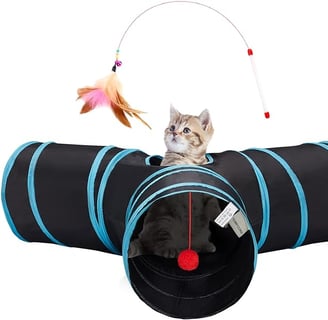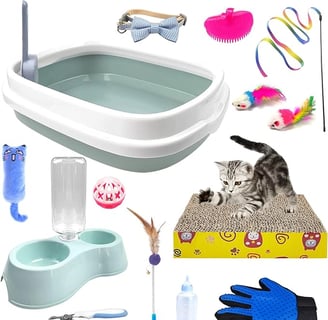The Ultimate Checklist for New Kitten Parents: Everything You Need for Your Fur Baby
5 min read


Essential Supplies for Your Kitten
Bringing a new kitten into your home is an exciting experience, and having the right supplies is crucial for ensuring a smooth transition for both you and your new furry family member. One of the first essentials is food and water dishes. Choose shallow, non-slip bowls made from stainless steel or ceramic, as these materials are durable and easy to clean. Ensure the size is appropriate for your kitten to facilitate eating and drinking.
Next, selecting high-quality kitten food is vital for your pet’s growth and development. Kittens require more protein, fat, and essential nutrients than adult cats, so opt for specially formulated kitten food that meets these dietary needs. Brands such as Royal Canin, Hill's Science Diet, and Purina Pro Plan offer vetted options to consider. Be mindful of introducing any dietary changes gradually to prevent digestive issues.
A litter box is another indispensable supply. Kittens instinctively utilize litter boxes, and it's essential to provide one that is accessible and appropriately sized. A low-sided box ensures your kitten can easily enter and exit. Pairing it with high-quality litter—whether clumping, non-clumping, or biodegradable—can promote cleanliness and comfort in their new environment.
To keep your kitten engaged and happy, invest in a scratching post. Scratching is a natural behavior that helps kittens maintain their claws and express their energy. Use sturdy materials like sisal or cardboard, and ensure the height accommodates your kitten’s stretching habits. Furthermore, incorporating toys, such as interactive and soft toys, can provide essential stimulation and help foster a bond between you and your new pet.
By equipping your home with these essential supplies, you lay the groundwork for a healthy, happy life for your kitten. Investing in quality products will not only meet their physical needs but will also enhance their overall well-being, ensuring a smooth transition into your family.
Creating a Safe and Comfortable Environment
Welcoming a new kitten into your home is a delightful experience, but it is crucial to ensure that your environment is safe and nurturing. The first step is to designate a specific area in your home that will serve as a sanctuary for your new furry friend. This space should be quiet and away from the hustle and bustle of your daily activities, making it an ideal spot for your kitten to explore and relax.
As you prepare the designated area, it is essential to remove any potential hazards that could pose a risk to your kitten's health and safety. Common household items, such as electrical cords, small objects that could be swallowed, and toxic plants, should be secured or removed entirely. Additionally, consider installing baby gates to restrict access to areas that may not be safe for a curious kitten.
Choosing appropriate sleeping areas is another vital aspect of creating a comfortable environment. Kittens often enjoy cozy, sheltered spaces where they can feel secure. Providing several soft bedding options, such as blankets or pet beds, in different locations will encourage your kitten to choose a spot that suits them best. Remember, kittens tend to prefer sleeping in secluded areas, so placing a comfortable bed in a quiet corner can be beneficial.
In addition to safety and comfort, enrichment opportunities are imperative for a kitten's physical and mental well-being. Engaging toys, scratching posts, and climbing structures can help stimulate your kitten's natural instincts. Introducing various items gradually allows your kitten to adapt and find favorites. Moreover, establishing a consistent routine will help your new kitten feel secure and adjust more comfortably to their new home, making the transition smoother for both you and your new companion.
Healthcare Essentials: Vet Visits and Vaccinations
Ensuring the health of your new kitten is paramount to fostering a happy and thriving pet. One of the essential first steps as a new kitten parent is to schedule an initial veterinary visit. This appointment allows the veterinarian to conduct a thorough examination, assess the overall health of your kitten, and discuss any immediate concerns. It's also an excellent opportunity for new owners to gain valuable insight into proper kitten care and nutrition.
Following the initial visit, vaccinations play a crucial role in protecting your furry friend from various diseases. Kittens typically receive a series of vaccines within the first few months of life. Core vaccines, such as those for feline viral rhinotracheitis, calicivirus, and panleukopenia, are vital for building immunity. Additionally, it is recommended to discuss the rabies vaccine and other non-core vaccines with your veterinarian based on your kitten’s lifestyle and risks.
Flea and tick prevention is another important aspect of kitten healthcare. These parasites can lead to serious health issues, so it is advisable to consult with your veterinarian on appropriate preventive treatments. Furthermore, spaying or neutering your kitten is critical not only for preventing unwanted litters but also for minimizing potential health risks and behavioral issues later in life.
Awareness of common health issues in kittens, such as upper respiratory infections, gastrointestinal problems, and dental disease, is crucial for new owners. Keeping an eye out for signs such as lethargy, lack of appetite, or unusual behavior can help in early detection of any health concerns. Regular veterinary care, including wellness checks, ensures that your kitten remains healthy and allows for timely intervention should any issues arise. Prioritize your kitten's health by keeping up with veterinary visits and vaccinations to guarantee a long and happy life together.
Training and Socialization for a Well-Behaved Kitten
Training and socialization are crucial components in raising a well-adjusted and well-behaved kitten. Starting these processes as soon as you bring your new fur baby home will help establish a strong foundation for their behavior and overall temperament. One of the first training objectives should be litter box training. Fortunately, most kittens instinctively seek a designated area for elimination. To facilitate this, ensure that the litter box is easily accessible, clean, and placed in a quiet but convenient location. Monitor your kitten’s movements and gently guide them to the litter box if necessary, rewarding them with praise or treats when they use it correctly.
In addition to litter box training, teaching basic commands can significantly enhance communication between you and your kitten. Simple commands such as "sit," "come," or "no" can help instill boundaries and expectations. Use consistent cues and positive reinforcement techniques, such as treats or affection, to encourage compliance. Keep training sessions short and engaging to hold your kitten's attention, gradually increasing the complexity of commands as they learn.
Socialization is equally vital, exposing your kitten to various people, environments, and even other pets. Early and positive interactions with unfamiliar situations will reduce anxiety and promote confidence. Invite friends over to allow your kitten to meet new people or take them on short car rides to familiarize them with traveling. Gradually introducing them to other pets will also foster friendly relations, reducing the likelihood of territorial disputes in the future.
Resources for training your kitten can include online videos, books, and professional trainers, which can offer additional techniques and support. By investing time in training and socializing your kitten, you will set them up for a harmonious relationship and a lifelong sense of security in their environment.











